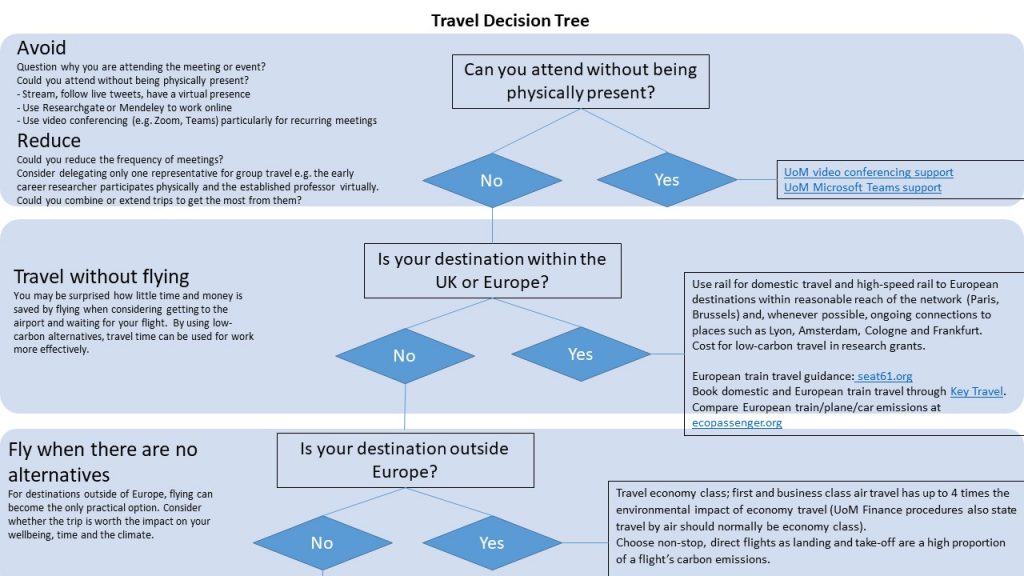Sustainability in SALC
Like many other parts of the university, the School of Arts, Languages and Cultures is looking for ways to support teaching and learning about sustainability as well as thinking about how we make our business activities more sustainable. In the course of these discussions we have sought advice from the Tyndall Centre, Manchester. The Tyndall Centre have developed their own travel strategy and as part of this use a decision tree to help make decisions about how and if to travel on business.
A working group within the school are currently looking at how we might adopt such an approach. The image below shows an updated version of the decision tree.
Some researchers in the school have experimented with different ways of developing their research in ways that avoid unnecessary travel by air. Dr Eithne Quinn who works in American Studies has made use of local research assistants for her archival research. She comments:
‘I have had excellent experiences of accessing archival materials remotely over the years by hiring hourly-paid US researchers. When I was researching my monograph, A Piece of the Action: Race and Labor in Post-Civil Rights Hollywood (NY: Columbia University Press), I needed primary materials from a number of special collections and, due to climate commitments, I wasn’t able to fly to the US. For instance, when I wanted material from the Margaret Herrick Library (Academy of Motion Pictures Arts and Sciences) in Los Angeles, I called the research librarian who sent me a list of names of local researchers who do this kind of work for scholars, including their areas of specialism and hourly rate. I hired someone (who I spoke to at some length about my needs) and the beauty was that, soon after, copious files arrived electronically which I could access from the comfort of my home office – a wonderfully convenient service, and someone who has worked for me again since. I’ve accessed other archives remotely, including the Dirksen Congressional Centre in Pekin, Illinois and the Nixon Presidential Library in Yorba Linda, CA. In the latter case, the research librarian didn’t have a list of names, but knew of a postgraduate researcher who was on site a lot who I hired and who turned out to be great value. The librarian contributed really good ideas about which files and boxes the researcher should look in, and the holdings were listed online, so one way or another I was able to unearth what I needed. Highly recommended!’
Other approaches might involve the use of rail travel in preference to short-haul flights. Dr Carlos van Tongeren’s work often means he has to take journeys across Europe. Carlos has found a number of useful resources to help him with this:
- The Man in Seat Sixty-One is a very helpful resource that describes how destinations all over Europe and in other parts of the world can be reached by train. Any country within Europe, and major destinations outside of Europe, can be selected from a drop-down menu; the next page then lists a number of destinations within a particular country and how they can be reached. The website has important practical advice not only on how/when to book, but also other practical tips on luggage, how to get the best seats and make the most of your trip.
- Rail Europe (formerly Loco2) is a helpful online database that can be used to book train trips to most European countries. Both the website and the app are very user-friendly. It is possible to set up travel alerts to receive a notification once foreign railway companies (e.g. TGV, Thalys or Renfe) have released tickets on their routes (normally a few months in advance). It can be helpful to combine Rail Europe with Trainline. For instance, to book a trip from Manchester to Paris, Brussels or Amsterdam, some of the times and options to travel from Manchester to London as part of that trip may not be listed on Rail Europe but you will certainly find them on Trainline. Once you learn how to combine both websites or apps alongside each other it is very easy to do this.
Over the next year SALC’s sustainability working group will be consulting more widely on how we can implement sustainable working practices in different areas in a way that supports research, teaching and social responsibility aims. If you want to know more about this or get involved, please contact Carlos van Tongeren, Eithne Quinn, Georg Christ or Simon Parry.


0 Comments